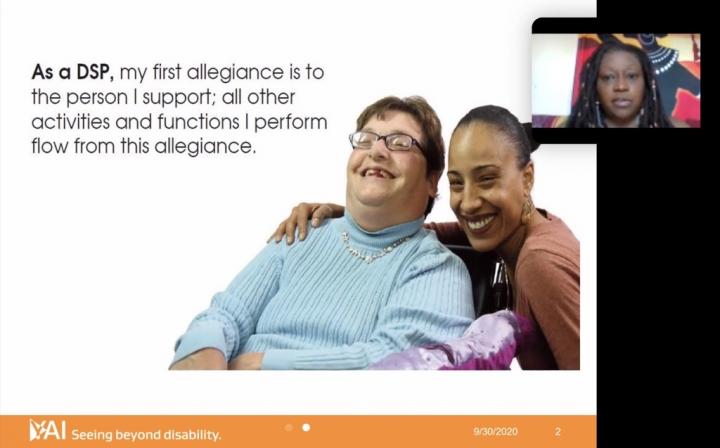 Consuelo Senior, Senior Director of Training at YAI, teaches a class on Zoom
Consuelo Senior, Senior Director of Training at YAI, teaches a class on Zoom
YAI is partnering with the largest local social services agency and the largest urban university system in the country in a unique effort to prepare people for careers supporting people with intellectual and developmental disabilities (I/DD).
In September, students interested in entering the profession began a 12-week training course at CUNY's Kingsborough Community College designed and taught by YAI staff. The students, who receive public assistance from the New York City Human Resources Administration (HRA), will be considered for employment at YAI and other agencies if they successfully complete the course.
Ava Padmore, YAI’s Director of Human Resources, is leading the year-long collaboration and said everyone involved will reap rewards. YAI will be able to recruit staff with a better understanding of what will be expected in this role, she says, and the students can find jobs and perhaps pursue further education at Kingsborough.
“It’s a trifecta because it benefits everybody,” Padmore said. “Everybody wins - YAI will be able to acquire well-trained Direct Support Professionals (DSPs), HRA will be able to offer their clients an opportunity for gainful employment, and Kingsborough will have a new academic offering that can transition students into a great job.”
Dr. Simone Rodriguez, Vice President of Workforce Development, Continuing Education and Strategic Partnerships at Kingsborough, called the course innovative because the curriculum is designed by YAI, a major employer in the field, and ensures that students have the experience necessary to enter the profession.
“Where else do you get a 100-hour training in starting a career?” Rodriguez asked. “Most jobs offer a one-hour orientation and set you out in open waters to sink or swim.”
The first cohort started their journey to certification after Labor Day, when 17 candidates underwent orientation. Many had questions ranging from how the skill sets developed in this program would differ from those learned by Home Health Aides. Others wanted to understand if, upon completion of the certification, placement would be guaranteed and whether certification would affect applications with other agencies that support the I/DD community. It showed just how serious this group is about the material, which is what we wanted to ensure through this process, said Lana Small, Assistant Director of Community Habilitation and Respite Services at YAI and orientation leader.
“It’s programs like these that can help others understand the role of a DSP and the important work they accomplish daily,” Small said.
Of particular advantage to students, according to Padmore and Rodriguez, is that the cost of the course will be paid by HRA through scholarships and reimbursements for travel and qualifying childcare expenses.
“Students don’t normally get these kinds of opportunities,” Rodriguez said. “It’s a great investment for them.”
The pilot course will include 60 hours of instruction and 40 hours of supervised field work at YAI’s day programs and community residences. Students who complete the classwork and internship will earn a certificate as a DSP from the Office of Continuing Education’s Healthcare Institute at Kingsborough. In a field with an extremely high vacancy rate, certification can be a calling card to job security.
Consuelo Senior, Assistant Director of Training at YAI, helped to design the comprehensive curriculum and is teaching the course. She said it will serve as an introduction to neurodevelopmental disorders and co-occurring mental health diagnoses. Lessons include understanding how to teach people with I/DD, empower them to develop skills and live as independently as possible, manage their behaviors, work with their families and caregivers, and, most importantly, develop emotional intelligence on the path to a healthy work/life balance.
Until now, Padmore says YAI has primarily relied on traditional job fairs and online channels to recruit talent. She says that approach has often resulted in a high level of attrition because some enter the YAI workforce without the necessary skills or accurate expectations of what is involved in caring for people with I/DD.
Padmore hopes to narrow those gaps through the Kingsborough training course. If it succeeds, YAI’s eventual goal is to roll it out to other campuses across the City University of New York.
“We are looking for people who are really intentional about wanting to work at YAI and are making an active choice to be here,” Padmore said.
